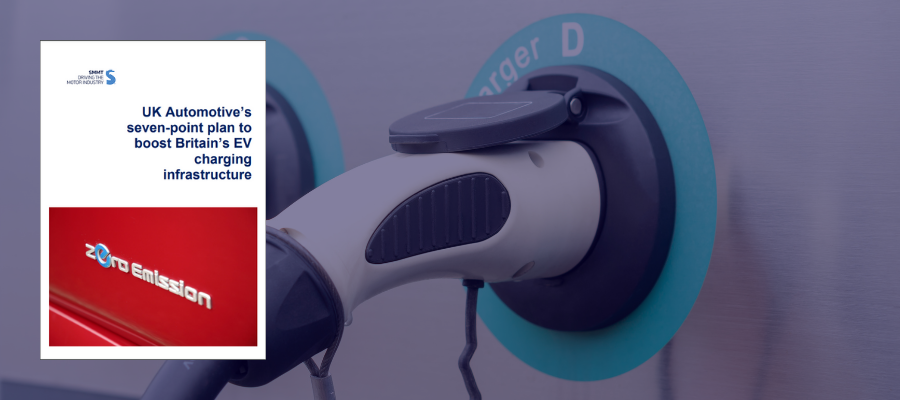🕒 Article read time: 2 minutes
Electrifying Britain – SMMT’s plan to boost EV charging infrastructure

The Society of Motor Manufacturers and Traders (SMMT) published a seven-point plan last week (15 February 2022), calling on electric vehicle (EV) infrastructure planning to be focussed on consumer needs, rather than commercial interests, to secure the UK’s commitment to a zero-emission future.
In his foreword to the plan, Mike Hawes, Chief Executive of SMMT, said that while the automotive industry had made significant investments in developing and introducing plug-in and battery electric vehicles (BEVs), the positive outlook for the growth in zero emission vehicles was contingent on the assumption that charging infrastructure is no longer a barrier to mass market uptake.
Unlocking the full environmental and socioeconomic benefits of the transition to net zero, Hawes argued, required collaboration between government and industry – specifically the fleet, infrastructure and energy sectors.
Since the first public chargepoints were installed in 2011, there has been a 3,000% growth in the public charging infrastructure. However, a series of studies and consumer surveys have shown that poor infrastructure provision remains a key concern for consumers and the main barrier to mass uptake, with charging anxiety replacing range anxiety.
CHARGING INFRASTRUCTURE LAGS EV UPTAKE
While registrations for plug-in vehicles and BEVs has surged, public charging infrastructure has lagged behind. Although plug-in cars on the road grew by 280% between 2019 and 2021, public chargepoints grew by just 69% over the same period.
In its paper, SMMT sets out the UK automotive industry’s view on the key measures required to deliver a charging infrastructure focused on consumer rather than commercial interests, with a seven-point plan.
-
EMBED CONSUMER-CENTRICITY IN POLICY
Consumer centricity means putting the interests of consumers first in every aspect of charging infrastructure development and expansion, including policy making. This should be based on three key principles: adequacy, experience and equity.
-
DEVELOP AND IMPLEMENT A NATIONAL INFRASTRUCTURE PLAN
While SMMT acknowledges that the government’s forthcoming EV infrastructure strategy is a step in the right direction, it argues that it needs to be accompanied by a nationally coordinated but locally delivered infrastructure plan.
-
INVEST SIGNIFICANTLY TO UPLIFT ALL TYPES OF CHARGING INFRASTRUCTURE
Government and the infrastructure sector should commit to bold and ambitious investments in expanding the rollout of all types of charging infrastructure, SMMT maintains, ensuring everyone has a universal “right to charge”.
-
SET BINDING TARGETS TO ENSURE ADEQUATE PUBLIC CHARGEPOINT PROVISION
SMMT argues that government should put in place a charging infrastructure mandate by setting binding targets of public chargepoint provision on a graduated basis, in relation to the expected number of plug-in vehicles on the road.
-
ENACT REGULATION TO DELIVER THE BEST OUTCOMES FOR THE CONSUMER
While SMMT welcomes the government’s various announcements setting out its intention to regulate to deliver the best outcomes for consumers, the trade body argues it is now important that government follows through and goes further by enacting regulation on minimum standards for consumers and creating a regulatory body.
-
PROVIDE SUPPORT TO INCENTIVISE AND FACILITATE CHARGING INFRASTRUCTURE
SMMT argues that the infrastructure sector and local authorities must be supported in delivering charging infrastructure through a raft of measures that work in combination. These should de-risk private investment and create investable propositions to address genuine market failures.
-
ENSURE ELECTRICITY NETWORKS ARE FUTURE-PROOFED FOR ZERO EMISSION MOBILITY
Although SMMT welcomes and supports the use of smart charging and Vehicle-to-Grid (V2G) as demand response mechanisms to help delay the need for costly electricity network reinforcements, it argues that smart charging must not be regarded as a silver bullet for network capacity constraints or a substitute for necessary network improvements.
Denise Beedell, Public Policy Manager, Logistics UK, said: “This seven-step plan from SMMT echoes many of Logistics UK’s calls for the development of EV chargepoint infrastructure. It contains specific steps that will benefit commercial vehicle fleets including calling for binding targets for 100% grid decarbonisation by 2035.
“We welcome this plan and urge government and the energy and infrastructure sectors to give careful consideration to SMMT’s seven recommendations.”
*www.logistics.org.uk/environment
Published On: 24/02/2022 16:00:25

Comments Section
If you are a Logistics UK member login to add comments.